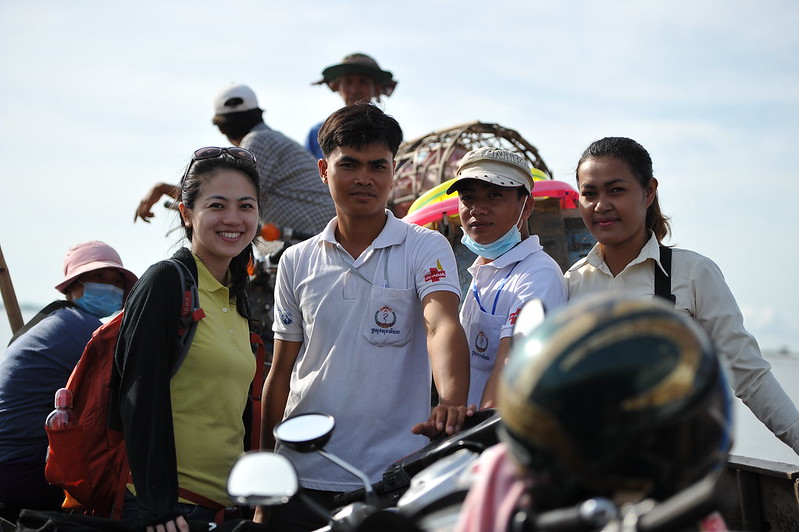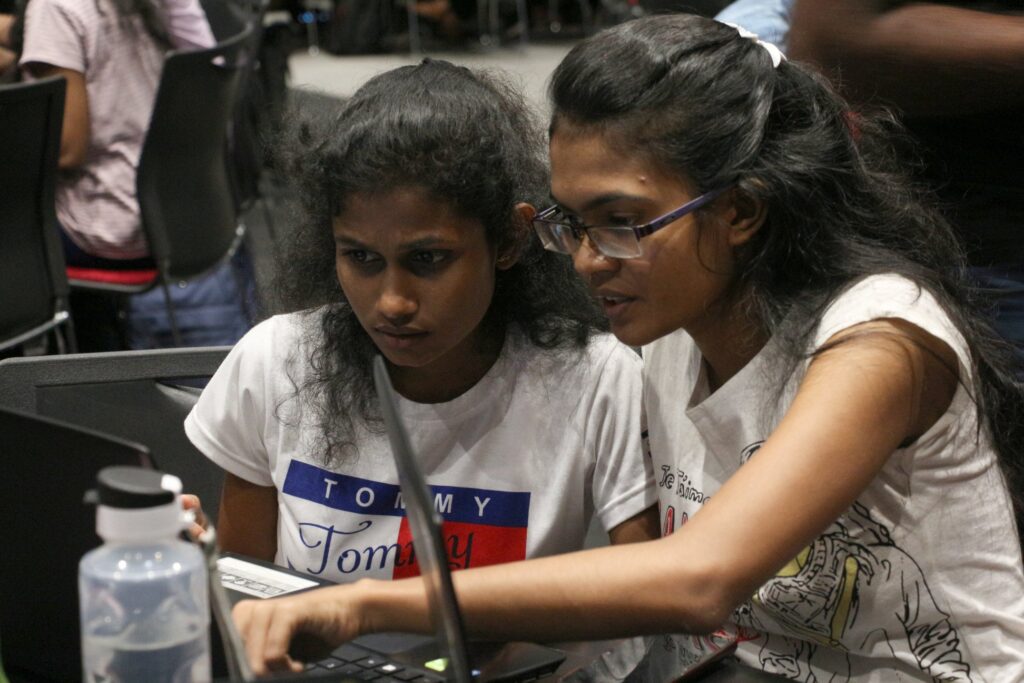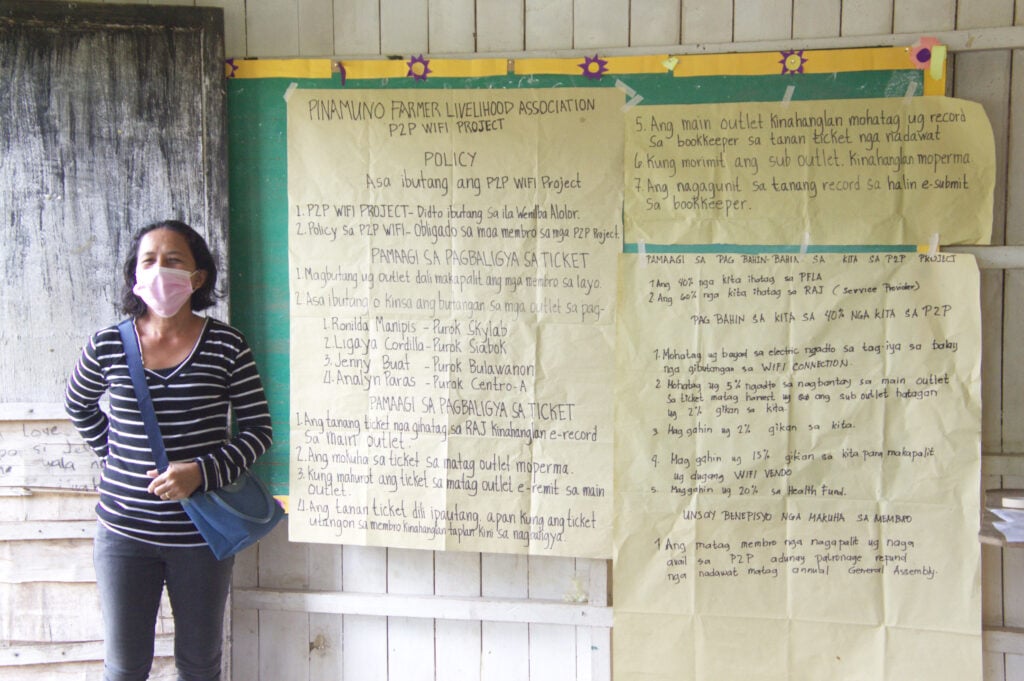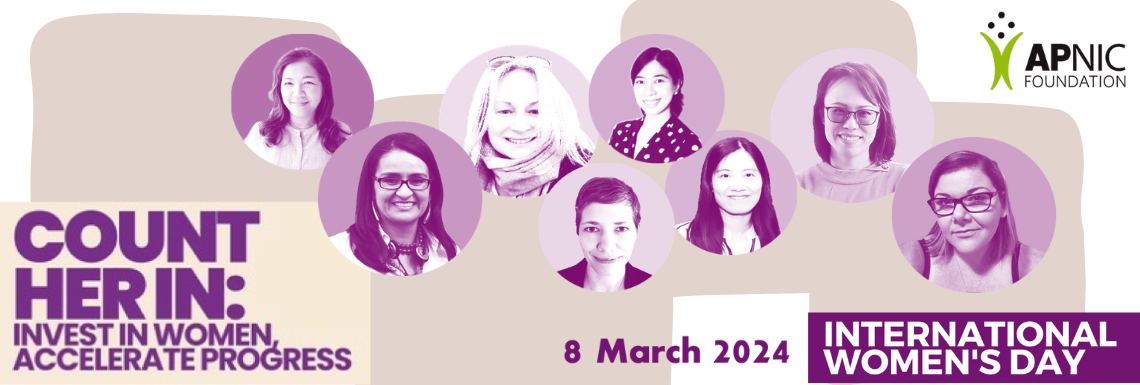On International Women’s Day IWD 2024, the Foundation is shining a light on the many ways in which women are central to our work. Writing this was an opportunity to reflect on how I have worked to structure our programming and processes and how although it has maintained its focus, it has continued to evolve. The commitment to incorporate gender equality and social inclusion in our work is in display, even before the Foundation was established.
The theme for IWD for this year is focused on Inclusion, and the UN Women’s campaign centered around investing in women to accelerate progress.
Before I dive into the organizations and individuals that we have been lucky to support, I want to also take a few minutes to recognize the incredible commitment of women in the Foundation team. Each of them in their own roles, and through their expertise, problem-solving and can-do attitude keep us on track, on budget and (mostly) on-time.
I am very privilege to work with Cathlene Corcoran, Ann Kerrison-Liu, Ellisha Heppner, Helen Arnold, as well as our National Coordinators, Mia Perez, Paan Ratanajaipan, Nhung Phan and Note Kijrattana. Their bios are on our staff page.
The support from our Board is key to move these initiatives forward, can’t thank enough Sylvia “Efie” Sumarlin for her unwavering support and belief in what we do.
Women are more than mobile users and consumers – they are creators
There are many organizations that provide support for women and girls in ICT, and for the most part (with some notable exceptions) the target audience for this investment tends to be end users. Engineers, cybersecurity professionals, software developers and other specialists in the industry are rarely mentioned, as if the Internet works magically. This reinforces existing biases that portray women as consumers of technology, not as designers, implementers and practitioners, the driving forces behind technology adoption and use. It doesn’t help that there are a very small number of women leading technology companies.
Looking at my past notes about how we started structuring our programming, how we allocated funding as well as many resources related to our fundraising efforts, I was able to put together the following themes:
- Build advanced technical skills in STEM fields as well as soft skills for leadership and communication
- Support women to get involved in infrastructure deployment to expand Internet access and adoption
- Increase visibility around women’s contributions to Internet development by supporting networking opportunities and amplifying their voices
- Encourage the participation of women and women-led businesses in digital markets to support women’s economic empowerment
- Build capacity through initiatives that support employment pathways for women in the Internet industry
- Promote the safe use of the Internet for women and girls by incorporating online safety by design across project interventions
- Support organizations that are defending the rights of women and girls online
Our commitment remains, and if you are interested to partner with us in any of those areas, please reach out!
Building from ISIF Asia’s legacy
Before the Foundation was established in 2017, the Information Society Innovation Fund (ISIF Asia) was launched by APNIC and other partners in 2008 to provide access to funding across Internet development.
Right from the beginning of ISIF Asia, gender diversity was included in the application form, selection criteria and reporting mechanisms. From the first grantees selected, there were many projects led by women in the field, as well as many that focused on issues related to gender and inclusion.
Many of these women were, and still are trailblazers, opening fields of research, piloting innovative ideas and betting on challenging deployments and business ventures. Through the years, the conversations with these incredibly talented women nurtured, challenged and made me realize how different (and in many cases similar!) their careers have been and to think how and what, access to funding and capacity development could unlock many of those challenges. The experiences and learnings were varied and deep as the unmet needs identified or the lack of understanding from traditional donors to what these projects, and these women wanted to achieve. Many of the same challenges still remain, while others have evolved or only grown at a scale that requires coordinated investment and approach.
Looking back at support for women in tech
When I started looking at the full list of ISIF Asia and Foundation funded initiatives to select some highlights… I found I just couldn’t! The list of ISIF Asia alone expands to 145 grant recipients and 34 award winners. It’s a long list full of talent and purpose, and is not even complete as there are many women supporting project implementation in a variety of roles. Where available, I have included links to their profiles, so please explore the links to learn about their careers and the projects they have been involved in.
Early years of ISIF Asia from 2009 to 2013: Focusing on health, the environment and women’s rights
In 2009, Kanchana Kanchanasut and Wit Hmone Tin Latt worked on the Development of emergency networks training and tools kit project, based on their DUMBO deployment, that inspired many by bringing Internet to communities in the back of elephants in Thailand.
The Capacity Building of Lady Health Workers in Rural Mardan project worked on a mobile platform to extend tele-healthcare in Pakistan. Then in 2010, Dr. Meenakshi Gautham led a project in India to enhance and standardize quality of care through guidelines available in a user-friendly mobile phone platform, which continues to be the focus of many tele-health projects.
In 2013, In Indonesia, Nathalia Devina Widjaja was starting to look at a cloud application for electricity monitoring; Shamila Keyani was working in Pakistan on the team that started using mobile phones to track diseases from their point of origin and prevent further spreading in low cost settings and was also an award winner in 2015 for her work with Jaroka, a mobile telehealth app; while in the Philippines, Mary Rose Ofianga focused on a project to monitor maternal mortality rates (that won the ISIF Asia award the following year) and Amakomaya was giving its first steps towards maternal health in Nepal.
The Jaroka Mobile Based Tele-Heathcare award-winning project
Jacqueline Homann was working on the localization to Burmese of the WNDW book that has inspired many community networks in the region in Myanmar; Bishakha Datta was opening minds with her reflections about women’s rights online in India; In the Philippines, Lisa Garcia (who now serves on one of our Selection Committees) was strengthening her action to prevent violence against women online.
2014 and 2015: Leadership in the Pacific, policy in South Asia and entrepreneurs in the Southeast
In 2014, Maureen Hilyard was instrumental in the support for two projects that provided opportunities for two emerging leaders in the Pacific Islands to make some of their ideas a reality (Etuate Cocker from Tonga to get support for his PhD on TCP tunnelling under the supervision of Dr. Ulrich Speidel in New Zealand and Ano Tisam with the Cook Islands Maori Database). Diana Kleine in Australia open my eyes to citizens science through the CoralWatch project and Laura Hosman provided insights into the reality of facilitating off-line access to educational resources in connection to the Chuuk server education hub project and her SolarSpell work using our joint site visit to Micronesia.
Jayshree Satpute and Francesca Feruglio worked to map maternal healthcare for tea plantation workers in Assam and provided critical evidence to advance policy changes in India. Jacqueline Chen worked to prevent the spread of tuberculosis in Cambodia and Chong Sheau Ching supported low-income women entrepreneurs in Indonesia and Malaysia.

2016 and 2017: Targeting women’s empowerment
In 2016, ISIF Asia distributed its first grant specifically focusing on women’s empowerment and innovation. We were able to provide not only larger grants, but also additional mentoring for business development that supported TechAge Girls in Myanmar and Kushi Baby in India.

That year, My Community Reader focused on language preservation in Thailand counted with the talent and experience of Melody Zavala. Legalese, which provides support to execute legal agreements with investors in Singapore counted with the leadership of “recovering lawyer” Alexis Chun. In 2017, through another project related to health provision in Indonesia, I had the great fortune to meet Nur Faridah. Sometime after she finished her project, she identified a professional opportunity that she really wanted to pursue, and she couldn’t miss. When she approached me to talk about possible ideas for support, there was an opportunity to support her, and we process our first professional development agreement and a payment to her selected training provider. Those were the roots of the approach for the Switch! project. She is now revolutionizing the hiring process with AI-driven solutions at Sqouts.com.
2018: Cultivating women leaders
In 2018, there were really visible opportunities to see emerging leaders receive support from their organizations to take leading roles, and conduct experimental research. These included, in Malaysia, Kelly Koh as part of the team that delivered the measuring interference project and Rihana Syahirah and her work on graph analytics and in Sri Lanka, Poormina Meeganmanna for her work to expand an IoT ambassadors program. The project from Child Helpline Cambodia was looking to extend online safety for women and girls.

2019 – 2021: Growing and supporting women through tough times
The projects that started receiving support during the pandemic have experienced a number of challenges related to the supply chain and recruitment. Natural disasters and conflict also affected their work. With a bit of flexibility, problem solving and active listening, projects are reaching completion, and are reporting on their impact and activities. During this period, as the Foundation was scaling up their work thanks to the support from the APIDT, many changes were introduced, including a powerful grants management system that has allowed us to systematically incorporate best practices in grant management. The Foundation did not stop its grant giving during this transition period, so the community continued to receive the support required, as the women behind this were literally building the plane while flying it.
In 2020 and 2021, Nalini Elkins worked on a series of webinars targeted to increase IPv6 adoption at large brick-and-mortar enterprises globally, while Chen Lin in Australia focused her work on AI analytics for solving the growing challenges in cybersecurity and network management and analysis on a second grant received the following year.
In 2021, Reina Wulansari worked to expand knowledge around complementary connectivity solutions in Indonesia with incredible bamboo tower designs, while in the Philippines, Josephine Alindajao led the implementation of connectivity for four villages in Davao which also received a new grant in 2023 for a project to Improve health service delivery through Internet connectivity.

In China, Weiqi Zhao was part of the team that delivered a collaborative BGP routing analyzing and diagnosing platform that is continuing with a new grant to extend the project activities She is also collaborating with Gao Yan to build high-speed interconnections among various supercomputing centers with 10Gbps/100Gbps access to IPv6 bandwidth. The second phase of the TechAge Girls was interrupted due to the political situation in Myanmar, but the team was able to complete it with a bit of flexibility on our part and the support from strong partners like IREX in Canada. Shalini A is working on gender, community networking in remote rural communities in India, and also focusing on local crafts for sustainable living.
2022: Women in IPv6, cybersecurity and sharing knowledge
In 2022, Lenora Leota’s work to connect schools is opening opportunities and building partnerships with the Samoa government at a national scale. Panita Pongpaibool’s work in cybersecurity is opening opportunities for small and medium factories in Thailand to have access to a Security Operations Center (SOC) as a service, using open-source software to reduce development and operation cost, making this service sustainable and affordable to SMEs. On IPv6 deployment, students like Vanessa Fernandes and Kavya Bhat are playing a very important role to support the migration of the campus network in India. They were recently selected by the Foundation to participate at the IETF 119 in Brisbane later this month, as Internet Standards Ambassadors. In Mongolia, work to increase women’s technical skills to overcome the technical skills shortage is progressing, while in the Philippines, Marie Lisa Dacanay and her team are working to incorporate entrepreneurial skills and business development processes for complementary connectivity solutions. In Timor Leste, Dulce Soares is using data-driven science for water management. In Indonesia, Ayu Pratiwi is supporting the work to tackle climate change misinformation, building partnerships to support action.
The Foundation today: Renewed commitment to women in tech
In 2023, grants supported our largest number of projects yet. 24. This means that this small yet mighty team at the Foundation is now tracking 68 projects across the APAC region, providing not only funding, but also networking opportunities and exploring ways to celebrate their success and impact. The recent APRICOT 2024 event in Thailand session on IPv6 deployment included reports from three IPv6 deployment projects.
The IPv6 Deployment Session at APRICOT 2024
Among the 2023 grant recipients, Beatrice Mok in Singapore handles fundraising and implements social impact projects to enable connectivity for schools, hospitals, and disaster related emergency communications at Kacific. Maria Beebe and Jelina Tetangco are leading the collaboration between their organizations to deploy an open network testbed laboratory. In Palau, Virginia Tellei is working on a hybrid power backup for reliable mobile data service. In Bangladesh, Salma Islam is assessing financial inclusivity of peer-to-peer solar microgrids across Rohingya refugee camps. Júlia G. Puig is leading the deployment of WIFI hotspots in community centres across four provinces in Cambodia, as well as in the recently renovated Prayuters Library, bringing Internet connectivity and digital skills to rural populations. Pushpa Chhetri is leading capacity building of network engineers in Bhutan, to provide International Certification on Digital Literacy (ICDL) training and certification on Cyber Security to the ICT professionals who are responsible for network engineering and cyber security in their respective organizations. Dr. Nem Khan Dim is working to upskill future trainers in nine townships of Chin State in Myanmar, to create an ICT development plan for the state.
Other initiatives supported count with the leadership of women like Yurie Ito, a visionary leader in the cybersecurity field, dedicated to pioneering the integration of public health principles into cybersecurity to create a safer digital world.
But project leaders move on. They change jobs, and pursue other professional development opportunities. A couple of recent examples include in Australia, Eugenia Georgiades. She established the Internet Law Clinic at her previous organization, and now at her current role she is expanding on her analysis of regulatory frameworks, licenses for operations and other legal barriers for the development of complementary connectivity solutions, access to satellites and other spectrum technologies. She is also invited along with Vanessa and Kavya, as an Internet Standards Ambassador for her work on privacy standards. Then in Indonesia, Amelinda Kusumaningtya’s work in content governance, disinformation, and digital inclusion led her to pursue a postgraduate degree in Technology Governance at the Australian National University (ANU). We supported her participation at TrustCon 2023.
We also provided awards over the years, and the stories of Sara Saeed Khurram, Nancy Margried, Nashin Mahtani and Thein Myint Khine are inspiring:
- Sara’s work in telehealth was transformational, as it didn’t center only in the patients that require care, but in the engagement of female doctors in the workforce, after they have married, but within the considerations of a solution that was culturally appropriate in Pakistan. She has developed a multi-million dollar operation, offering opportunities for women across the health sector and expanding with new products to the United Arab Emirates.
- Nancy’s work to improve the quality of batik manufacturing products in Indonesia using technology but respecting traditional techniques, led her leave her position for a while to complete advanced studies in the United Kingdom as a Chevening Scholar. She returned to expand her company and continues to support batik artisans. We purchase some of our corporate gifts from her company, and I definitely encourage you to go shopping at Batik Fraktal.
- Nashin’s work around the use of mobile technology for disaster prevention and management was revolutionary at the time it was first introduced over a decade ago, and has been recognized by the Red Cross as well as the US Federal Communications Commission.
Hear about Khine’s work for yourself, as she was among our most recent awardees.
The 2023 ISIF Asia awards included Thein Myint Khine accepting an award on behalf of Myanmar Internet Exchange.
Seek the right advice, because there is no right way to do the wrong thing
Women have also being incredible allies and supporters throughout the years, to improve processes and communication, and to strengthen the programmatic and operational capacity of the Foundation. In 2011, as the volume of reports published was increasing, it was important to improve how the impact of projects was going to be communicated to the community. We engaged an ICT4D expert (Revi Sterling), who has built a remarkable career advancing women’s digital rights, to define a structure for project summaries and guide their preparation, with a focus on mapping project outcomes. The summaries were a very simple and practical communication mechanism back then, before the ISIF Asia website had a blog feature. Over the years, ISIF Asia continued to receive support from International Development Research Centre (IDRC) to further its monitoring and evaluation approaches, through support provided via different phases of the Developing Evaluation Capacity in ICTD (DECI) project. In that space, we got support from Sonal Zaveri on monitoring and evaluation approaches and Vira Riyandari on research communications. Kara Francis, helped us to develop our grants management portal and continuously supports us through its use, adoption and continuous improvements. Ruth Whereat helped us to start approaching our work through a gender equality and social inclusion framework, in a more structured way and thanks to her tenacity, we have an action plan that needs funding to move forward.
The emergence of the Switch! Project – supporting women and gender diverse people
The initial areas of focus were refined to align with our mission, but remained across the support that the Foundation has made available to the community as well as part of the fundraising opportunities that we have pursued, in particular the Switch! Gender and Diversity project which is delivering professional development support for women and gender-diverse people in the Internet industry, so that they can acquire the skills and confidence they need to thrive in their chosen goals. Since the project started in 2020, initially funded by DFAT and now with the support of the APIDT, 221 women and gender diverse professionals have received support to access technical training and education, professional certification, coaching, research support and networking opportunities. The support is comprehensive and personalized, and based on individual plans that are structured against personal goals. In the last two APRICOT conferences, we have showcased the project and its evolution, and you can watch the recordings for 2023 and 2024. Some of the stories remarkable stories of personal development and growth are:
- Morokot Cheat worked as Technical Official of the Ministry of Post and Telecommunications in Cambodia and was recently promoted to Deputy Director. Besides support for training, she received support to boost her skills and develop her confidence, which has helped her advance in her career. She received research support on Data Compression and Cryptography, and shared it at a national conference in Cambodia;
- Kanokwan Aimsumang is the Head of IT Security in a large-scale fintech company, Ascend Money in Thailand. She pursued certifications as CISSP and ISO 27001 Lead Implementer, alongside soft skill development in policy development, English, and storytelling. Through her development and attending mentoring sessions, she enhanced her team management skills, mastering delegation, and communication.
- Le Tung Hoa is a lecturer from Posts and Telecommunications Institute of Technology in Viet Nam. She has taught in the field of Wireless Communication for over 10 years. When she joined the project she had motivation, but after receiving research support from project, she rekindle her interest in research and started PhD program on Telecommunication Technology.
- Dircia da Silva spent eleven years working for Timor Telecom as on Mobile Access Network Planning and Optimization. Among others, she completed certifications in cybersecurity and artificial intelligence, that led her to a new role in Network and Data Center Planning at TIC TIMOR I.P (a public institution for the Timor-Leste government.
- Anisone Kingsada is the Deputy Director General of the Center of Technology Promotion and Transfer of the Ministry of Technology and Communications of Laos. When she join Switch!, she was the Director of the National Domain Name Division, of LANIC. She got her inner strength by participating in mentoring sessions, leadership and public speaking courses, along with several technical courses. All of those made her the strong woman she is today. She admitted that it was an incredible experience and a significant milestone in her life by making that decision to join Switch! in the first place.
The Switch! Project was showcased at the Foundation session APRICOT 2024 / APNIC 57
I would also like to highlight Lima Madomi and Rooh Afza Abobakr. They had made a remarkable contribution to the Foundation work in Afghanistan and well as to make the most of the opportunities offered. Lima, with her experience in project coordination helped resume the Afghanistan School on Internet Governance (AFSIG) activities after a three-year hiatus. Her passion for big data sustainability and her active engagement in international events highlight her commitment to advancing women’s role in ICT. Rooh Afza, on the other hand, through her determination, experience in IT support and management helped with the Afghanistan Youth IGF (AyIGF) revival. Despite interruptions to her formal education, she continues to improve in areas of cybersecurity, and virtualization, inspiring other women to pursue their passion in ICT.
We are not alone… women at APNIC and in our wider community are responsible for our success
The contributions of APNIC staff have made everything possible: Irene Chan, for helping setting so many things up; Bhadrika Panchal on everything editing; Jessica Wei, Shane Hermoso, Joyce Chen, Melody Bendindang and Karla Skarda, for their support to the Selection Committees; Aye Clark, Marci Trew, Alana Pound, Sofia Silva, Swati Ghai, Sarah McAree, Monali Hirapara and many others, as well as the foundational efforts that former staff members Hannah Durack and Sarah Rochford put forward, to be able to structure many of the current processes that support our programmatic operations. Massive gratitude to each and every one of them!
Finally to the women in the community that have provided ideas, mentoring, connections, revisions and reviews, there is also a shout out: Narelle Clark, Wanqing Tu, Christina Chu, Liza Garcia, Jennifer Chung, Bronwyn Manley, Christine Or, Carolyn Florey, Congxiao Bao, Kalyani Menon-Sen, Jessica Shen, Julie Wang, and Karen Rose (who was one of the ISIF Asia founders, along with Paul Wilson and Rich Fuchs), Chat Garcia-Ramilo, Karen Banks and Anriette Esterhuysen.



